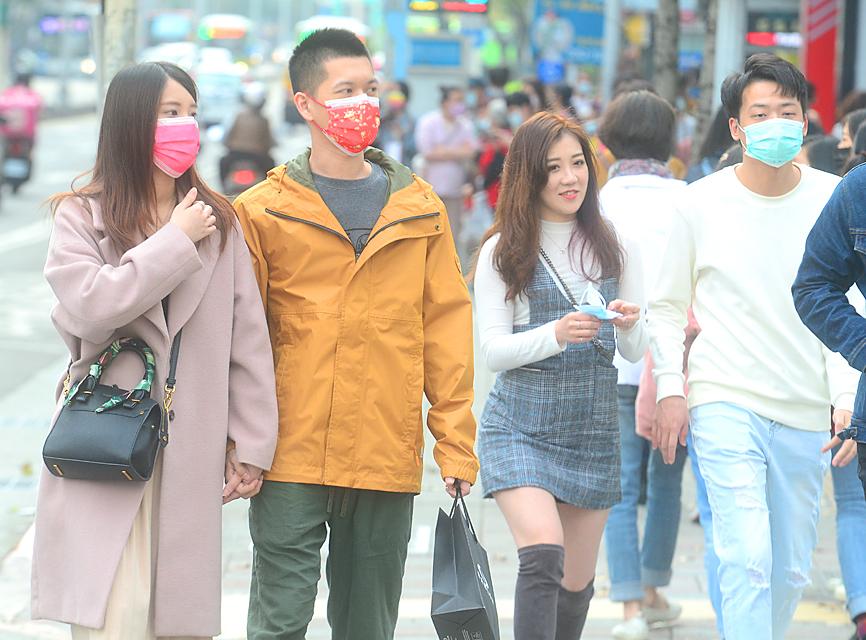A strong cold air mass is expected to arrive in the nation tomorrow evening, sending temperatures plummeting on Wednesday, when most people return to work after the weeklong Lunar New Year holiday, National Central University adjunct associate professor of atmospheric sciences Daniel Wu (吳德榮) said yesterday.
Citing simulations by the European Center for Medium-Range Weather Forecasts, Wu said that from last night to daytime tomorrow, humidity brought by the northeast monsoon would continuously decrease.
Eastern Taiwan is expected to see periodic showers, while northern Taiwan is forecast to have mostly cloudy and partly sunny weather, and central and southern Taiwan would have mostly sunny and partly cloudy weather, said Wu, a former Central Weather Bureau Weather Forecast Center director.

Photo: Wang Yi-sung, Taipei Times
Comfortable temperatures with cooler mornings and evenings are forecast across the nation, he added.
However, the leading edge of a “strong cold air mass” is forecast to arrive tomorrow night, bringing partial rain to northern and eastern Taiwan, he said.
Weather models by different countries show that the strong cold air mass would advance southward on Wednesday, causing a sudden drop in temperatures, he said
Northern and eastern Taiwan are forecast to see periodic showers, Wu said, adding that northern Taiwan is expected to be wet and cold, then dry and cold from Wednesday evening.
The weather is expected to remain dry and cold across the nation from Thursday to Saturday, he said.
Due to the cold air mass and the radiative cooling effect in the evening, temperatures might drop below 10°C, so people should be alert to drastic changes in the temperature, he added.

‘TAIWAN-FRIENDLY’: The last time the Web site fact sheet removed the lines on the US not supporting Taiwanese independence was during the Biden administration in 2022 The US Department of State has removed a statement on its Web site that it does not support Taiwanese independence, among changes that the Taiwanese government praised yesterday as supporting Taiwan. The Taiwan-US relations fact sheet, produced by the department’s Bureau of East Asian and Pacific Affairs, previously stated that the US opposes “any unilateral changes to the status quo from either side; we do not support Taiwan independence; and we expect cross-strait differences to be resolved by peaceful means.” In the updated version published on Thursday, the line stating that the US does not support Taiwanese independence had been removed. The updated

‘CORRECT IDENTIFICATION’: Beginning in May, Taiwanese married to Japanese can register their home country as Taiwan in their spouse’s family record, ‘Nikkei Asia’ said The government yesterday thanked Japan for revising rules that would allow Taiwanese nationals married to Japanese citizens to list their home country as “Taiwan” in the official family record database. At present, Taiwanese have to select “China.” Minister of Foreign Affairs Lin Chia-lung (林佳龍) said the new rule, set to be implemented in May, would now “correctly” identify Taiwanese in Japan and help protect their rights, the Ministry of Foreign Affairs said in a statement. The statement was released after Nikkei Asia reported the new policy earlier yesterday. The name and nationality of a non-Japanese person marrying a Japanese national is added to the

AT RISK: The council reiterated that people should seriously consider the necessity of visiting China, after Beijing passed 22 guidelines to punish ‘die-hard’ separatists The Mainland Affairs Council (MAC) has since Jan. 1 last year received 65 petitions regarding Taiwanese who were interrogated or detained in China, MAC Minister Chiu Chui-cheng (邱垂正) said yesterday. Fifty-two either went missing or had their personal freedoms restricted, with some put in criminal detention, while 13 were interrogated and temporarily detained, he said in a radio interview. On June 21 last year, China announced 22 guidelines to punish “die-hard Taiwanese independence separatists,” allowing Chinese courts to try people in absentia. The guidelines are uncivilized and inhumane, allowing Beijing to seize assets and issue the death penalty, with no regard for potential

There is no need for one country to control the semiconductor industry, which is complex and needs a division of labor, Taiwan’s top technology official said yesterday after US President Donald Trump criticized the nation’s chip dominance. Trump repeated claims on Thursday that Taiwan had taken the industry and he wanted it back in the US, saying he aimed to restore US chip manufacturing. National Science and Technology Council Minister Wu Cheng-wen (吳誠文) did not name Trump in a Facebook post, but referred to President William Lai’s (賴清德) comments on Friday that Taiwan would be a reliable partner in the